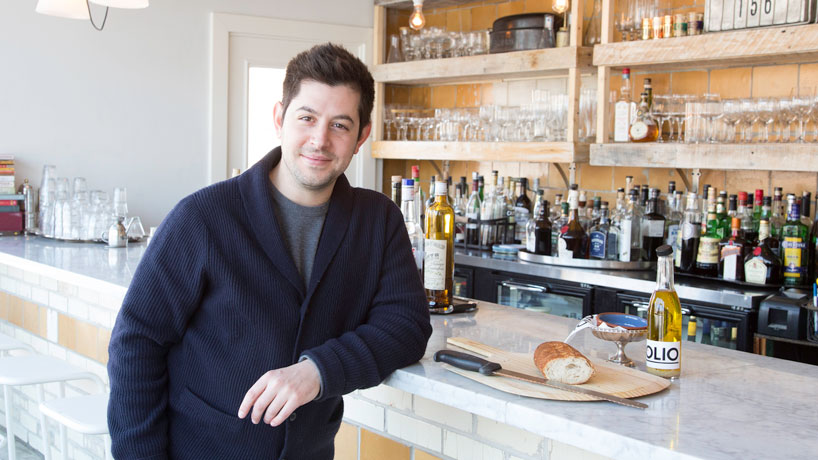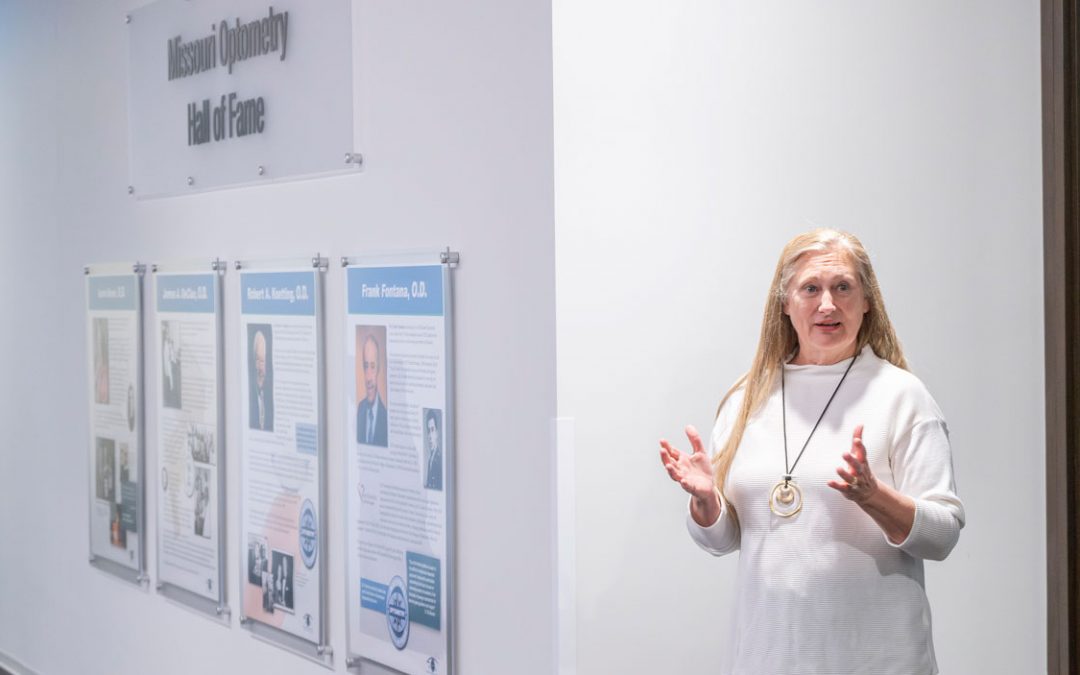
Chef and restaurant owner Ben Poremba (BA philosophy 2003) is helping revitalize the Botanical Heights neighborhood in St. Louis with the four businesses he opened on Tower Grove Avenue. (Photo by August Jennewein)
Good food and a lively atmosphere have long been reasons for social gathering. It’s also what chef and restaurant owner Ben Poremba recognized as necessary to revitalize the Botanical Heights neighborhood in St. Louis.
“I really knew there was going to be a transformation,” says Poremba, who earned his philosophy degree in 2003 from the University of Missouri–St. Louis. “I believed that my restaurant was sort of the missing link, and I sensed my place in that transformation.”
So he opened up his dual project, which pairs Elaia, a fine-dining restaurant, with Olio, a wine bar. The fine-dining room occupies a completely renovated 1890s house that Poremba has connected through a single corridor to the corner gas station he transformed into Olio. The choice of names is fitting too. Each means “oil.”
“I wasn’t looking for a gas station, but I was definitely looking for an unusual space to do my restaurant in,” Poremba says. “I am a big fan of industrial looks, and it fit my aesthetics for the wine bar.”
From Israel and son of a Moroccan mother and chef, Poremba’s cooking explores the Mediterranean flavors and ingredients he grew up with. But he says his dishes shouldn’t be limited to that label and experience.
“That’s maybe the very foundation of what I do. But to call my cooking Mediterranean, specifically at Elaia, is a far fetch because what I cook here is my cuisine. It is a reflection of what I am, the sum of my experiences.”
Those experiences extend from classic French cuisine to Italian influences, Afghani food and South American dishes, to name a few.
Poremba wants to offer a dining experience that goes beyond eating good food though. Cocktails come out in antique glasses. Bills are served on small, flowered platters. He jokes about having an addiction for antiquing and junking, but for Poremba those small details are the finishing touches of a fulfilling restaurant experience.
“People would open restaurants, and they would buy chairs, tables and lighting fixtures that were cookie cutter,” he says. “I just wanted to spend a little more time about being clear. I think now in St. Louis there is an amazing scene. Restaurateurs are taking their time and opening restaurants that are beautiful, that are unique, carefully choosing their silverware, their glassware, napkins and tables.”
Building part of the old Botanical Heights into something new and exciting didn’t stop with Elaia and Olio, either. Poremba has also opened up Old Standard Fried Chicken, an eatery and whiskey bar, as well as La Patisserie Chouquette, a pastry shop he helped chef and owner Simone Faure start just across the street.
“The idea, particularly in this neighborhood, was to create a sort of density of projects,” he says. “Ideally, people want to see a neighborhood that’s been a haven for crime and neglect and poverty become a place where people can afford buying a new house, go and have a coffee or pastry. They can come in, have a glass of wine and dinner. They can send their kids to school here.
“There’s a really great school around the corner from me, City Garden Montessori. It’s the best-performing tuition-free school in the state. I think people want to see a neighborhood in the old sense of a neighborhood. You come to it and really live in it. If I had just opened up this [Olio and Elaia], it may have been successful, but people would have come in, parked their car and left. You wouldn’t get this sort of traffic.”
Poremba says he has really gotten to see his vision come to life.
“When we opened up there was all of a sudden a lot of light, and people took heed of the corners. It was nice, you know. It felt like it was buzzing, as opposed to this quiet, discreet restaurant you come in and out of.”
Still, he doesn’t consider himself the hero of the neighborhood.
“People in St. Louis crave new things. I think I was just answering back to what people were telling me.”
Poremba has come a long way from his philosophy days at UMSL. Then again, he says philosophy, in a way, overlaps with cooking and restaurant business. Asking big questions, like whether to serve fish when so far inland, helps him build out his menu and fine-tune his dual restaurant project.
It recently was announced that Poremba is up for Food & Wine magazine’s People’s Best New Chef in the Midwest award. He was also named a semifinalist for the James Beard Award for Best Midwest Chef, an honor he compares to the Oscars. He’s hoping a fellow St. Louis chef, Gerard Craft, owner of Niche, will win.
“I can say he sort of opened the door for people like me,” Poremba says. “And if he wins it this year, it’d be even greater. It will spotlight the city.”
That’s an exciting possibility to Poremba, who says St. Louis is yet a village in the world of fine cuisine. He’s energized to be a part of the young, unfolding restaurant scene here and has ideas and aspirations to open up more restaurants across the city.
Beyond the possibilities it affords him, there’s one big reason Poremba chose to build his life in St. Louis – “It’s home.”















